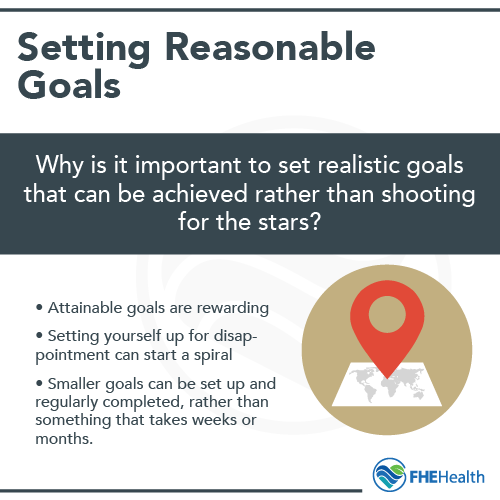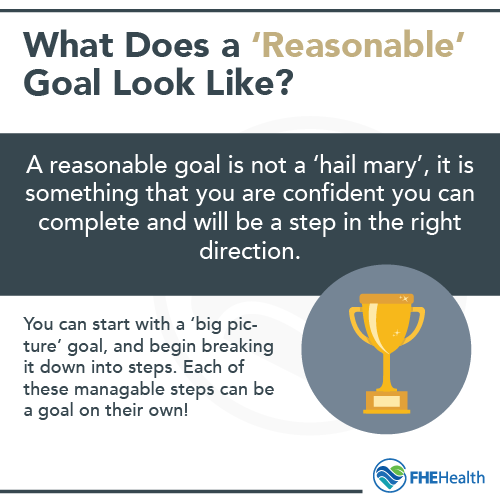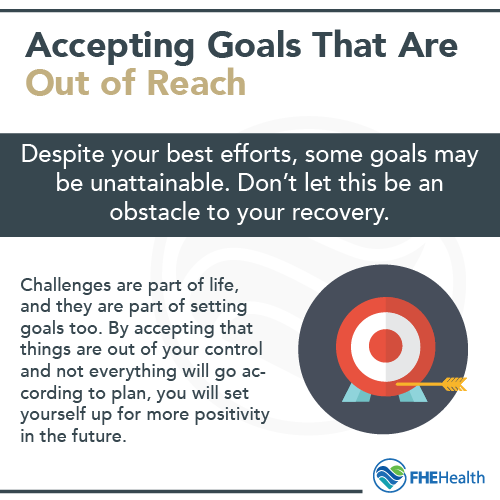
After rehab, it’s easy to feel like the world is your oyster. However, getting sober and staying sober isn’t as easy as it sounds.
It’s easy to imagine all of the things you will accomplish — landing a dream job at a prestigious company, getting married to the partner of your dreams or starting a family — now that you’re sober, but it’s important to slow down. Recovery isn’t something that happens overnight, and re-acclimating to sobriety isn’t going to be a fast or simple process. Instead of reaching for the stars as soon as you’re out of treatment, it’s critical to set realistic and reasonable goals that are within the bounds of what is possible.
This is what you need to know about setting recovery goals after you’re finished with rehabilitation.
Creating a Road Map for Post-Treatment Success
 For those who are newly out of treatment, whether inpatient or outpatient, the world often looks brand-new again. With the old occupations, like buying drugs or drinking all day, you may be wondering how to fill the days and how to set goals.
For those who are newly out of treatment, whether inpatient or outpatient, the world often looks brand-new again. With the old occupations, like buying drugs or drinking all day, you may be wondering how to fill the days and how to set goals.
While the future is open to you, there may be some barriers that were created by past indiscretions. From legal consequences to gaps in career history due to time spent in rehabilitation, it’s important to acknowledge and live with these facts. While theoretically anything is possible, it’s necessary to keep a realistic grasp on reality, particularly when it comes to overcoming the roadblocks posed by addiction recovery and life post-treatment.
During this time, it’s very important for goals to be both short-term and easily attainable — and ideally in a step-by-step format that can help you stay focused on the next milestone to come.
For example, when you first get out of rehabilitation, you may be moving into a halfway house or your family’s home. If, for example, your goal is to get your own place, the first step will likely be getting a job, the next may be to get a car and the last may be to save enough money to demonstrate worthiness to a landlord. By creating this kind of progressive goal structure, it’s much easier to tackle things day by day.
Why Reasonable Goals Matter
So, winning a Nobel Prize is on your bucket list. That’s wonderful — winning a Nobel means accomplishing something outstanding — but it’s ultimately not likely, particularly not in the near future. While setting long-term goals is admirable, it’s not going to help you in the present.
Failing to meet objectives can be deeply disappointing, and nothing can hold you back like a personal failure. When your goals aren’t realistic and attainable in the near future, it’s easy to tell yourself that you’re not good enough to reach them, and this line of thinking can result in further substance abuse. Of those with substance abuse disorders, 40% to 60% will eventually relapse, so the more you can do to keep yourself on the right path, the better.
What a Reasonable Goal Looks Like
 One of the primary objectives of many newly recovered addicts is to get a job. What this means, however, can vary greatly depending on education, job history, resume and references.
One of the primary objectives of many newly recovered addicts is to get a job. What this means, however, can vary greatly depending on education, job history, resume and references.
So, for example, you have a college degree and worked in accounting for a few years before quitting and taking a serving job to better accommodate your spiral into addiction before quitting work entirely to go to inpatient and outpatient rehabilitation programs. In this situation, getting a job is definitely a priority, but it’s important to be realistic. Getting back into accounting may not be immediately possible, especially without a consistent job history.
It’s critical to be realistic in your expectations — any job is better than no job, so there’s no real reason to hold out for an accounting job while ignoring all other options. Getting a job waiting tables again or working in retail can put money in your pocket while helping you save the cash you need to go back to school or aim for an unpaid internship that can help you get your foot back in the door. At this point, a career with the Big Four accounting firms — a common goal for accounting students — isn’t likely.
On the other hand, perhaps you don’t have a clear career history. Maybe you worked a number of entry jobs in retail, restaurants or warehouses that don’t necessarily align with a career path.
In this case, it’s in your best interest to find any job to help you get back on your feet, using your previous job history, or taking this time to figure out what you want to do and how you’re going to get there. If you’ve always dreamed of being an electrician, for example, now is the time to build a financial base so that you can enroll in a trade program to eventually reach your goals.
Challenges in Setting Goals
 Setting recovery goals is never easy, particularly when you’re considering those outside of your control.
Setting recovery goals is never easy, particularly when you’re considering those outside of your control.
For example, maybe your goal is to reconnect with the family you isolated during your addiction. While this is a noble objective and can improve overall well-being, you can’t force family members to accept and forgive you, particularly if you hurt them deeply in the past. As such, it’s important to acknowledge the separation between yourself and your objectives.
If you apologize repeatedly and show evidence of changed behavior and your family is still unwilling to make amends, the ball is no longer in your court. Under these circumstances, you need to realize that you’ve done all you can and that the only thing that will make a difference is either continued effort or acceptance.
Challenges are a part of life, and they’re a part of setting goals too. By understanding that nothing in life truly goes according to plan, it’s easier for you to accept that not every goal you set for yourself will be as simple as apologizing for your wrongs.
Get the Help You Need
If you’re struggling with drug or alcohol addiction, you’re not alone. In the United States, over 21 million adults live with a substance use disorder.
However, help is here. At FHE Health, we’re experts in working through substance use disorders, offering a step-down model of care that emphasizes comprehensive treatment for the best possible results. From addressing behavioral issues that may be contributing to poor behavior to addressing healthy and realistic goal setting, we can help you succeed in the recovery process.






